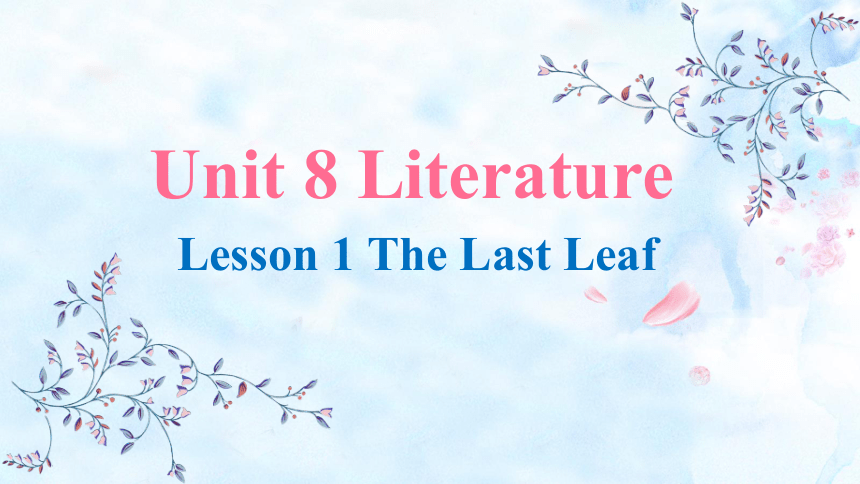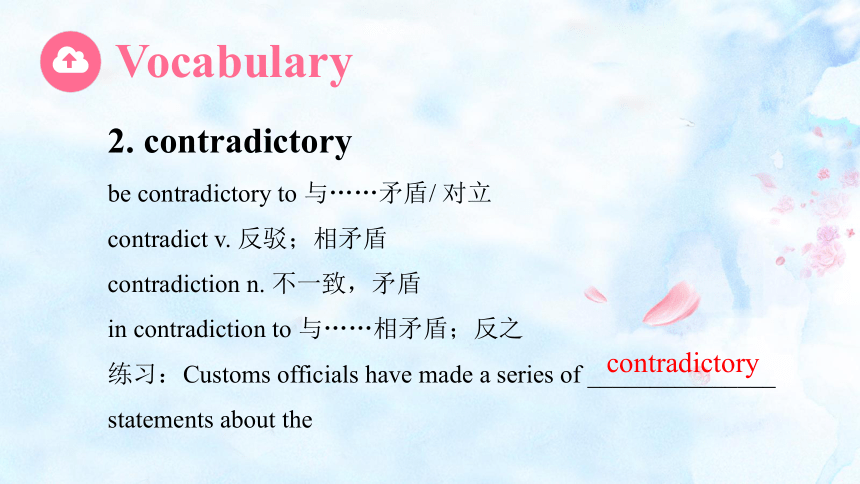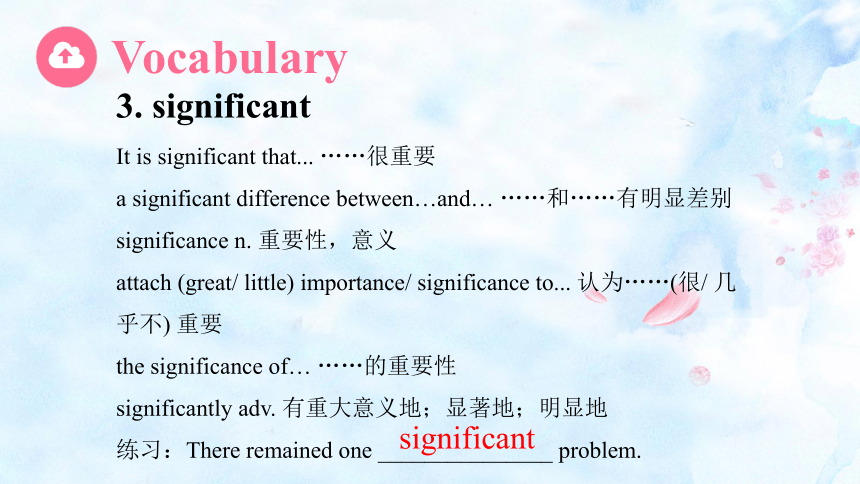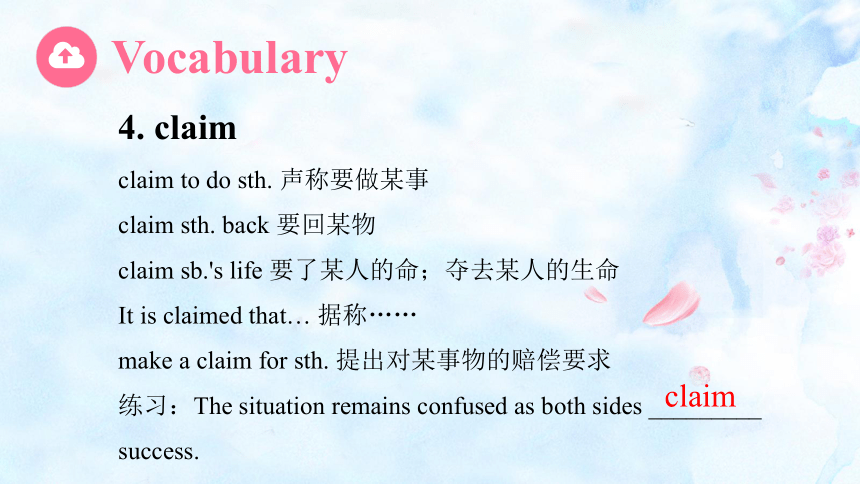北师大版(2019)选修三Unit 8 Literature Lesson 1 The Last Leaf课件(共45张PPT)
文档属性
| 名称 | 北师大版(2019)选修三Unit 8 Literature Lesson 1 The Last Leaf课件(共45张PPT) |  | |
| 格式 | pptx | ||
| 文件大小 | 28.4MB | ||
| 资源类型 | 教案 | ||
| 版本资源 | 北师大版(2019) | ||
| 科目 | 英语 | ||
| 更新时间 | 2024-02-03 20:05:29 | ||
图片预览












文档简介
(共45张PPT)
Unit 8 Literature
Lesson 1 The Last Leaf
Leading in
Who is the author
O. Henry
Leading in
ACTIVATE AND SHARE
How much do you know about O. Henry Find some background information about him. Search online if necessary.
1. Where was O. Henry from ___________
a. UK b. France c. USA
2. As a writer, he was most famous for ___________.
a. novels b. short stories c. poems
3. He started the writing style of ___________.
a. surprise endings b. humorous starts c. sad endings
c
b
a
Leading in
O. Henry was an American short story writer, the founder of the American modern short story, whose stories are set in his own time, the early 20th century. Many take place in New York City and frequently feature characters with blue-collar jobs, such as policemen and waitresses. Among them, The Gift of the Magi, The Cop and The Anthem and The Last Leaf enjoy huge popularity.
Vocabulary
1. absorbing
absorb vt. 吸收;吸引;使专心
absorb one's attention 吸引某人的注意
absorb…from… 从……中吸收……
be absorbed in 全神贯注于
练习:Children will find other exhibits equally ______________.
absorbing
Vocabulary
2. contradictory
be contradictory to 与……矛盾/ 对立
contradict v. 反驳;相矛盾
contradiction n. 不一致,矛盾
in contradiction to 与……相矛盾;反之
练习:Customs officials have made a series of _______________ statements about the
contradictory
Vocabulary
3. significant
It is significant that... ……很重要
a significant difference between…and… ……和……有明显差别
significance n. 重要性,意义
attach (great/ little) importance/ significance to... 认为……(很/ 几乎不) 重要
the significance of… ……的重要性
significantly adv. 有重大意义地;显著地;明显地
练习:There remained one _______________ problem.
significant
4. claim
claim to do sth. 声称要做某事
claim sth. back 要回某物
claim sb.'s life 要了某人的命;夺去某人的生命
It is claimed that… 据称……
make a claim for sth. 提出对某事物的赔偿要求
练习:The situation remains confused as both sides _________ success.
claim
Vocabulary
Vocabulary
5. attempt
attempt to do sth. 尝试/ 努力做某事
make an attempt to do/ at doing sth. 试图/ 努力做某事
at the first attempt 第一次尝试时
in an attempt to do… 试图做……
attempted adj. 未遂的
attempted murder 谋杀未遂
练习:He dived into his pocket in an _________ to find the key.
attempt
Vocabulary
6. disbelief
in disbelief 难以置信地,怀疑地
belief n. 信仰;信念;相信,信心
beyond belief 令人难以置信
It's one's belief that... = One's belief is that…
某人相信……
练习:Liz stared at us in _____________ as we told her what had happened.
disbelief
READ AND EXPLORE
"The Last Leaf" is one of O. Henry's most famous short stories.
Read the story quickly and answer the questions.
1. Who are the main characters
The main characters are Sue, Johnsy, Mr Pneumonia (personified), the doctor, and Mr Behrman.
2. When and where did the story take place
The story took place in November in Greenwich Village, New York City.
3. What happened at the end
Mr Behrman dies of pneumonia because he painted an ivy leaf for Johnsy in the rain.
Main characters
Time
in 2._________
Place
in 3.__________ Village , New York City.
The plot
of the story
Johnsy was badly 4.____ with Pneumonia .
She counted the 5.______ out of the window.
She thought she must die when the last leaf 6._____.
Three days later 7.___________remained on the vine.
The ending
It was Behrman who 9._______ the masterpiece and gave hope to Johnsy. But he himself died.
November
ill
leaves
fell
painted
The
last
leaf
Sue, 1.________—the patient, the doctor, Mr Behrman and Mr Pneumonia.
Johnsy
Greenwich
the last leaf
Johnsy changed her attitude to life and cheered up.
Mr Behrman was sick with 8.__________.
Pneumonia
READ AND EXPLORE
Pair Work Read the story more carefully. Complete the timeline with what happened in the story. Then tell the story.
In November, Johnsy ___
____________________. The doctor ___________
____________________.
Johnsy counted the leaves on the ivy vine and thought ______________
_____________________.
Behrman and Sue looked out of the window and found _____________.
The next morning Johnsy___________
___________________________________________.
The next day, Mr Behrman ______. The janitor found ______________________________ the day before.
The following day, Johnsy ___________
_____________. The doctor _________
________________________.Mr Behrman________________________.
sick with pneumonia
said she
might not get better
one leaf left
that she must die when the last ivy leaf falls
asked to look out of the window and saw the leaf was still there
saw the leaf
said she
would live and get better
was sick with pneumonia
died
Mr Behrman in bed with pain
got
was still there
READ AND EXPLORE
Answer the questions.
1. When Sue began a pen drawing in Johnsy's room, what did Johnsy do
Johnsy started to count the ivy leaves when Sue began a pen drawing in Johnsy's room.
2. When Sue told Mr Behrman about Johnsy's belief, what was Mr Behrman's response
Mr Behrman cried with disbelief and thought that Johnsy's belief was foolish.
READ AND EXPLORE
3. Behrman said, "This is not a place in which Miss Johnsy shall lie sick. Someday I will paint a masterpiece, and we shall all go away." What did he mean
Mr Behrman realised that Johnsy would become better, and that he would paint his masterpiece before they all died.
4. How did Johnsy change her attitude
She saw that the last leaf remained brave and realised that she was wrong to want to die.
READ AND EXPLORE
5. What did the janitor find
The janitor found Mr Berhman in bed wearing wet clothes and in terrible pain.
6. Why did Mr Behrman get pneumonia
Mr Berhman got pneumonia because he was outside in the cold rain painting the leaf on the wall.
7. Are there any descriptions that you find impressive Underline them and explain why.
Climax
Falling Action
Rising Action
Johnsy was ill.
Johnsy counted the leaves outside.
There was only one leaf outside the window.
The following day, the last leaf was still there. Johnsy survived.
Mr Behrman died.
READ AND EXPLORE
"Ten, nine, eight, seven..." (para. 4)
"They are falling fast now," (para. 5)
"there was just one remaining leaf" (para. 8)
"the leaf was still there!" (para. 10)
The Leaves
falling
one left
Johnsy's attitudes
"When the last one falls, I must go, too..."(para. 5)
"It will fall today. And I will die with it"(para. 9)
"It is a crime to want to die."(Para. 11)
negative
positive
Mr. Behrman's health
"In 40 years he had never produced the masterpiece he longed to paint."(para. 7)
"And now I must see a fellow downstairs, Behrman. Pneumonia, too. There is no hope for him."(para. 12)
"Mr Behrman died today."(para. 13)
healthy
died
awful
READ AND EXPLORE
Read paragraph 2 of the story. Answer the questions.
1. How did the writer describe pneumonia
O. Henry described pneumonia as if it were a character. He personified the sickness by saying it placed its finger on Johnsy.
2. Why did he describe pneumonia in this way
He described it in this way in order to make pneumonia scary.
3. How do you feel about the description
READ AND EXPLORE
Pair Work In the story, the writer uses different words to express similar meanings. Read the story and write them down. Then work in pairs and use each word to describe a scene.
say: _____________________________________
see: _____________________________________
die: _____________________________________
claim, ask, reply, cry, tell
look, watch, stare, notice
go, go sailing down, go away, slip away
Group Work
Think and share
1. What do you think Sue's comment "it's Behrman's masterpiece" means
It was painted true to life that Johnsy didn't even find it was a picture. It is the best art he ever painted because it kept Johnsy hopeful and alive.
Group Work
Think and share
2. What do you think the story is trying to express
The story is trying to express how people love and take care of each other. It also invites readers to think about attitudes towards life.
Group Work
Think and share
3. Does the ending of the story surprise you If yes, how What do you think of such an ending
It is surprising because the reader expects Johnsy to either die or recover, but the reader does not think that Mr Berhman would be affected by Johnsy's sickness.
FOCUS ON LANGUAGE:
STATE VERBS AND ACTIVITY VERBS
1. Look at the following verbs from the text. Which verbs can be used in both simple and continuous tenses Which can be used only in simple tenses
lie have hear find watch stare notice count
fall sail drop open remain visit wonder encourage
Only in simple tenses In both simple and continuous tenses
is arrive
hear, find, notice, remain
lie, have, watch, stare, count, fall, sail, drop, open, visit, wonder, encourage
FOCUS ON LANGUAGE:
STATE VERBS AND ACTIVITY VERBS
2. Which sentences cannot be changed into the present continous tense
a. The coffee tastes awful.
b. We have breakfast very early.
c. They feel they need more time.
d. I have a serious headache.
e. She thinks about her mother a lot.
√
√
FOCUS ON LANGUAGE:
STATE VERBS AND ACTIVITY VERBS
3. Which of the following sentences are wrong Correct the wrong ones.
1. I'm loving the painting you bought yesterday.
I love the painting you bought yesterday.
2. Dad is lying on the bed now.
3. We are noticing the changes in the experiment.
We noticed the changes in the experiment.
4. He's having a bath.
5. Why is he staring at me
6. Where did he drop his suitcase
EXPRESS YOURSELF
1. What typical writing features have you noticed in "The Last Leaf" Give examples.
2. Find more information about O. Henry's stories and his writing style online. Share the information you found with the class.
语法:状态动词和动作动词
一、状态动词
状态动词描述状态,一般不用于进行时态。以下是最常见的状态动词:
1. 表达思维活动的动词:admit, agree, believe, know, mean, prefer, realise, remember, think, understand, want...
He admitted taking the money, but promised never to do it again.
他承认拿了钱,但他保证再也不会做这样的事了。
2. 表达情感的动词:adore, care, like, dislike, love, hate, hope…
Cultural note: we adore potatoes in the UK. They are a comfort food.
文化便签:在英国,我们非常喜欢土豆。土豆是一种非常适宜的食物。
3. 表示拥有和存在的动词:appear, be, belong, contain, have, include, need, seem, possess, stand, lie…
We've bought the house, but we can't possess it before July.
我们买下了这栋房子,但要到7月份才能拥有它。
4. 感官动词:feel, hear, look ,see, smell, sound, taste…
This kind of cloth feels very soft.
这种布摸上去很软。
This flower smells very sweet.
这朵花闻起来很香。
注意:
1. 有些状态动词也可以表示动作。在这种语境下,这些动词可以用于进行时态。
2. 感官连系动词feel, smell, sound, taste, look等,其后要使用形容词,而不用副词。
二、动作动词
动作动词描述动作,可用于一般时态和进行时态。动作动词分为持续性动作和终止性动词。
1. 持续性动词
持续性动词又称延续性动词,表示一种可以持续的行为过程或状态。常见的持续性动词:burn, drink, eat, fly, have, keep, know, lie, live, play, rain, read, run, sing, sleep, smoke, snow, stand, study, talk, wait, walk, wear, work...
2. 终止性动词
终止性动词又称非延续性动词,表示行为或过程是瞬间完成的。常见的终止性动词:admit, arrive, begin, borrow, buy, break, close, come, die, fall, go, hit, join, jump, leave, lose, move , marry, open, put , return, reach, start, stop…
3. 持续性动词与终止性动词的用法
(1)持续性动词可用表示一段时间的状语修饰,而终止性动词则不可。
How long can I keep the book 这本书我可以借多久?
They will work here till next Friday.
他们要在这里工作到下周五。
He was a French traveller who lived in Italy for some time.
他是一位法国旅行家,在意大利生活过一段时间。
(2)有时,终止性动词也可同表示一段时间的时间状语搭配。但这种表示一段时间的状语,实质上是表示一段时间内的某个时间“点”。
The play will start in half an hour.
戏剧将在半个小时内开始。
The fire broke out during the night.
火灾是夜间发生的。
(3)终止性动词一般不用于while引起的时间状语从句。
While I came home she was cooking dinner. (×)
When I came home she was cooking dinner. (√)
我到家时,她正在做饭。
(4)持续性动词前加 get/ begin/ come to等可表示短暂性动作。
When did you get to know him
你什么时候认识他的?
They began to see that they had made a serious mistake.
他们开始认识到自己犯了一个严重的错误。
(5)常用的持续性动词与终止性动词的对照:
词义 终止性动词 持续性动词
爱上 fall in love with be in love with
联系 get in touch with keep in touch with
穿 put on wear
结婚 marry be married
认识 get to know know
回来 come back be back
离开 leave be away
死 die be dead
Practice
1. He _____________ (has joined/ has been) in the army for three years.
2. There _____________ (stands/ is standing) an old temple on the top of the hill.
3. Look, she _____________ (has/ is having) some tea in the bar.
4. She __________________ (has been married/ has married) for seven years and has two sons.
has been
stands
is having
has been married
Thank you
Unit 8 Literature
Lesson 1 The Last Leaf
Leading in
Who is the author
O. Henry
Leading in
ACTIVATE AND SHARE
How much do you know about O. Henry Find some background information about him. Search online if necessary.
1. Where was O. Henry from ___________
a. UK b. France c. USA
2. As a writer, he was most famous for ___________.
a. novels b. short stories c. poems
3. He started the writing style of ___________.
a. surprise endings b. humorous starts c. sad endings
c
b
a
Leading in
O. Henry was an American short story writer, the founder of the American modern short story, whose stories are set in his own time, the early 20th century. Many take place in New York City and frequently feature characters with blue-collar jobs, such as policemen and waitresses. Among them, The Gift of the Magi, The Cop and The Anthem and The Last Leaf enjoy huge popularity.
Vocabulary
1. absorbing
absorb vt. 吸收;吸引;使专心
absorb one's attention 吸引某人的注意
absorb…from… 从……中吸收……
be absorbed in 全神贯注于
练习:Children will find other exhibits equally ______________.
absorbing
Vocabulary
2. contradictory
be contradictory to 与……矛盾/ 对立
contradict v. 反驳;相矛盾
contradiction n. 不一致,矛盾
in contradiction to 与……相矛盾;反之
练习:Customs officials have made a series of _______________ statements about the
contradictory
Vocabulary
3. significant
It is significant that... ……很重要
a significant difference between…and… ……和……有明显差别
significance n. 重要性,意义
attach (great/ little) importance/ significance to... 认为……(很/ 几乎不) 重要
the significance of… ……的重要性
significantly adv. 有重大意义地;显著地;明显地
练习:There remained one _______________ problem.
significant
4. claim
claim to do sth. 声称要做某事
claim sth. back 要回某物
claim sb.'s life 要了某人的命;夺去某人的生命
It is claimed that… 据称……
make a claim for sth. 提出对某事物的赔偿要求
练习:The situation remains confused as both sides _________ success.
claim
Vocabulary
Vocabulary
5. attempt
attempt to do sth. 尝试/ 努力做某事
make an attempt to do/ at doing sth. 试图/ 努力做某事
at the first attempt 第一次尝试时
in an attempt to do… 试图做……
attempted adj. 未遂的
attempted murder 谋杀未遂
练习:He dived into his pocket in an _________ to find the key.
attempt
Vocabulary
6. disbelief
in disbelief 难以置信地,怀疑地
belief n. 信仰;信念;相信,信心
beyond belief 令人难以置信
It's one's belief that... = One's belief is that…
某人相信……
练习:Liz stared at us in _____________ as we told her what had happened.
disbelief
READ AND EXPLORE
"The Last Leaf" is one of O. Henry's most famous short stories.
Read the story quickly and answer the questions.
1. Who are the main characters
The main characters are Sue, Johnsy, Mr Pneumonia (personified), the doctor, and Mr Behrman.
2. When and where did the story take place
The story took place in November in Greenwich Village, New York City.
3. What happened at the end
Mr Behrman dies of pneumonia because he painted an ivy leaf for Johnsy in the rain.
Main characters
Time
in 2._________
Place
in 3.__________ Village , New York City.
The plot
of the story
Johnsy was badly 4.____ with Pneumonia .
She counted the 5.______ out of the window.
She thought she must die when the last leaf 6._____.
Three days later 7.___________remained on the vine.
The ending
It was Behrman who 9._______ the masterpiece and gave hope to Johnsy. But he himself died.
November
ill
leaves
fell
painted
The
last
leaf
Sue, 1.________—the patient, the doctor, Mr Behrman and Mr Pneumonia.
Johnsy
Greenwich
the last leaf
Johnsy changed her attitude to life and cheered up.
Mr Behrman was sick with 8.__________.
Pneumonia
READ AND EXPLORE
Pair Work Read the story more carefully. Complete the timeline with what happened in the story. Then tell the story.
In November, Johnsy ___
____________________. The doctor ___________
____________________.
Johnsy counted the leaves on the ivy vine and thought ______________
_____________________.
Behrman and Sue looked out of the window and found _____________.
The next morning Johnsy___________
___________________________________________.
The next day, Mr Behrman ______. The janitor found ______________________________ the day before.
The following day, Johnsy ___________
_____________. The doctor _________
________________________.Mr Behrman________________________.
sick with pneumonia
said she
might not get better
one leaf left
that she must die when the last ivy leaf falls
asked to look out of the window and saw the leaf was still there
saw the leaf
said she
would live and get better
was sick with pneumonia
died
Mr Behrman in bed with pain
got
was still there
READ AND EXPLORE
Answer the questions.
1. When Sue began a pen drawing in Johnsy's room, what did Johnsy do
Johnsy started to count the ivy leaves when Sue began a pen drawing in Johnsy's room.
2. When Sue told Mr Behrman about Johnsy's belief, what was Mr Behrman's response
Mr Behrman cried with disbelief and thought that Johnsy's belief was foolish.
READ AND EXPLORE
3. Behrman said, "This is not a place in which Miss Johnsy shall lie sick. Someday I will paint a masterpiece, and we shall all go away." What did he mean
Mr Behrman realised that Johnsy would become better, and that he would paint his masterpiece before they all died.
4. How did Johnsy change her attitude
She saw that the last leaf remained brave and realised that she was wrong to want to die.
READ AND EXPLORE
5. What did the janitor find
The janitor found Mr Berhman in bed wearing wet clothes and in terrible pain.
6. Why did Mr Behrman get pneumonia
Mr Berhman got pneumonia because he was outside in the cold rain painting the leaf on the wall.
7. Are there any descriptions that you find impressive Underline them and explain why.
Climax
Falling Action
Rising Action
Johnsy was ill.
Johnsy counted the leaves outside.
There was only one leaf outside the window.
The following day, the last leaf was still there. Johnsy survived.
Mr Behrman died.
READ AND EXPLORE
"Ten, nine, eight, seven..." (para. 4)
"They are falling fast now," (para. 5)
"there was just one remaining leaf" (para. 8)
"the leaf was still there!" (para. 10)
The Leaves
falling
one left
Johnsy's attitudes
"When the last one falls, I must go, too..."(para. 5)
"It will fall today. And I will die with it"(para. 9)
"It is a crime to want to die."(Para. 11)
negative
positive
Mr. Behrman's health
"In 40 years he had never produced the masterpiece he longed to paint."(para. 7)
"And now I must see a fellow downstairs, Behrman. Pneumonia, too. There is no hope for him."(para. 12)
"Mr Behrman died today."(para. 13)
healthy
died
awful
READ AND EXPLORE
Read paragraph 2 of the story. Answer the questions.
1. How did the writer describe pneumonia
O. Henry described pneumonia as if it were a character. He personified the sickness by saying it placed its finger on Johnsy.
2. Why did he describe pneumonia in this way
He described it in this way in order to make pneumonia scary.
3. How do you feel about the description
READ AND EXPLORE
Pair Work In the story, the writer uses different words to express similar meanings. Read the story and write them down. Then work in pairs and use each word to describe a scene.
say: _____________________________________
see: _____________________________________
die: _____________________________________
claim, ask, reply, cry, tell
look, watch, stare, notice
go, go sailing down, go away, slip away
Group Work
Think and share
1. What do you think Sue's comment "it's Behrman's masterpiece" means
It was painted true to life that Johnsy didn't even find it was a picture. It is the best art he ever painted because it kept Johnsy hopeful and alive.
Group Work
Think and share
2. What do you think the story is trying to express
The story is trying to express how people love and take care of each other. It also invites readers to think about attitudes towards life.
Group Work
Think and share
3. Does the ending of the story surprise you If yes, how What do you think of such an ending
It is surprising because the reader expects Johnsy to either die or recover, but the reader does not think that Mr Berhman would be affected by Johnsy's sickness.
FOCUS ON LANGUAGE:
STATE VERBS AND ACTIVITY VERBS
1. Look at the following verbs from the text. Which verbs can be used in both simple and continuous tenses Which can be used only in simple tenses
lie have hear find watch stare notice count
fall sail drop open remain visit wonder encourage
Only in simple tenses In both simple and continuous tenses
is arrive
hear, find, notice, remain
lie, have, watch, stare, count, fall, sail, drop, open, visit, wonder, encourage
FOCUS ON LANGUAGE:
STATE VERBS AND ACTIVITY VERBS
2. Which sentences cannot be changed into the present continous tense
a. The coffee tastes awful.
b. We have breakfast very early.
c. They feel they need more time.
d. I have a serious headache.
e. She thinks about her mother a lot.
√
√
FOCUS ON LANGUAGE:
STATE VERBS AND ACTIVITY VERBS
3. Which of the following sentences are wrong Correct the wrong ones.
1. I'm loving the painting you bought yesterday.
I love the painting you bought yesterday.
2. Dad is lying on the bed now.
3. We are noticing the changes in the experiment.
We noticed the changes in the experiment.
4. He's having a bath.
5. Why is he staring at me
6. Where did he drop his suitcase
EXPRESS YOURSELF
1. What typical writing features have you noticed in "The Last Leaf" Give examples.
2. Find more information about O. Henry's stories and his writing style online. Share the information you found with the class.
语法:状态动词和动作动词
一、状态动词
状态动词描述状态,一般不用于进行时态。以下是最常见的状态动词:
1. 表达思维活动的动词:admit, agree, believe, know, mean, prefer, realise, remember, think, understand, want...
He admitted taking the money, but promised never to do it again.
他承认拿了钱,但他保证再也不会做这样的事了。
2. 表达情感的动词:adore, care, like, dislike, love, hate, hope…
Cultural note: we adore potatoes in the UK. They are a comfort food.
文化便签:在英国,我们非常喜欢土豆。土豆是一种非常适宜的食物。
3. 表示拥有和存在的动词:appear, be, belong, contain, have, include, need, seem, possess, stand, lie…
We've bought the house, but we can't possess it before July.
我们买下了这栋房子,但要到7月份才能拥有它。
4. 感官动词:feel, hear, look ,see, smell, sound, taste…
This kind of cloth feels very soft.
这种布摸上去很软。
This flower smells very sweet.
这朵花闻起来很香。
注意:
1. 有些状态动词也可以表示动作。在这种语境下,这些动词可以用于进行时态。
2. 感官连系动词feel, smell, sound, taste, look等,其后要使用形容词,而不用副词。
二、动作动词
动作动词描述动作,可用于一般时态和进行时态。动作动词分为持续性动作和终止性动词。
1. 持续性动词
持续性动词又称延续性动词,表示一种可以持续的行为过程或状态。常见的持续性动词:burn, drink, eat, fly, have, keep, know, lie, live, play, rain, read, run, sing, sleep, smoke, snow, stand, study, talk, wait, walk, wear, work...
2. 终止性动词
终止性动词又称非延续性动词,表示行为或过程是瞬间完成的。常见的终止性动词:admit, arrive, begin, borrow, buy, break, close, come, die, fall, go, hit, join, jump, leave, lose, move , marry, open, put , return, reach, start, stop…
3. 持续性动词与终止性动词的用法
(1)持续性动词可用表示一段时间的状语修饰,而终止性动词则不可。
How long can I keep the book 这本书我可以借多久?
They will work here till next Friday.
他们要在这里工作到下周五。
He was a French traveller who lived in Italy for some time.
他是一位法国旅行家,在意大利生活过一段时间。
(2)有时,终止性动词也可同表示一段时间的时间状语搭配。但这种表示一段时间的状语,实质上是表示一段时间内的某个时间“点”。
The play will start in half an hour.
戏剧将在半个小时内开始。
The fire broke out during the night.
火灾是夜间发生的。
(3)终止性动词一般不用于while引起的时间状语从句。
While I came home she was cooking dinner. (×)
When I came home she was cooking dinner. (√)
我到家时,她正在做饭。
(4)持续性动词前加 get/ begin/ come to等可表示短暂性动作。
When did you get to know him
你什么时候认识他的?
They began to see that they had made a serious mistake.
他们开始认识到自己犯了一个严重的错误。
(5)常用的持续性动词与终止性动词的对照:
词义 终止性动词 持续性动词
爱上 fall in love with be in love with
联系 get in touch with keep in touch with
穿 put on wear
结婚 marry be married
认识 get to know know
回来 come back be back
离开 leave be away
死 die be dead
Practice
1. He _____________ (has joined/ has been) in the army for three years.
2. There _____________ (stands/ is standing) an old temple on the top of the hill.
3. Look, she _____________ (has/ is having) some tea in the bar.
4. She __________________ (has been married/ has married) for seven years and has two sons.
has been
stands
is having
has been married
Thank you
